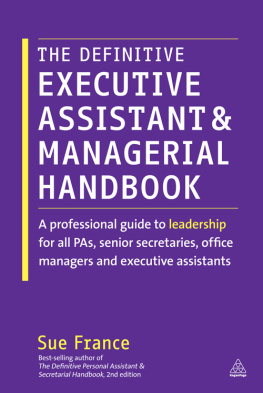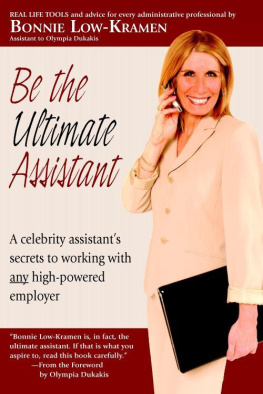Lets be totally honest: I started a Web site called Save the Assistants because I hated my job. I wish I could tell you that I quit said job right after the first in-the-bathroom cryfest and immediately became a spunky Norma Rae type heroine, but the truth is that it took some time to build up enough courage to walk out. I may have been desperate, but I wasnt stupidliving in New York was not free, and I needed even the meager $28K salary.
I grew up in North Carolina and attended a state university there. A couple of months after graduating, armed with a degree in English Lit and dreams of making it as a writer (whatever that means), I moved to New York City. I didnt have any friends or connections in the city, so like a lot of other young people, I applied for every job that was even loosely related to what I wanted to do. In other words, I spent a lot of time temping. One day, the woman who ran my temp agency got me an interview to be the receptionist at a big media company. Although being a receptionist wasnt my dream job, the company sounded interesting and I figured that while I was sitting at the front desk I would also have time to keep sending out rsums and obsessively refreshing the Craigslist job boards. The company, which well just call the Evil Empire, hired me right away. Then, on my first day, while I was unpacking my stuff at the reception desk, the office manager casually informed me that I was also going to be someones assistant. Surprise!
Being an assistant at the Evil Empire meant you spent lots of time getting screamed at for stuff like stapling something in a way your boss didnt like. Although most of our bosses at the Evil Empire were backstabby and competitive with one other, the assistants didnt follow suit and became a pretty close-knit group. One of the assistants I bonded with was named Ashley Seashore. Unlike me, whod had only internships, Ashley had a decent amount of work experience, and she helped me figure out the everyday ins and outs of working in an office. She taught me about all the things I hadnt learned in college but desperately needed to know at a joblike when to BCC people on e-mails, how to handle criticism, and what to say when you got blamed for something that wasnt your fault. If not for her, I would have either been fired or had a nervous breakdown by the end of the second week.
We assistants got along pretty well and formed an unofficial support group for one another. Somebody always checked on you when you had a hangover, helped salvage the PowerPoint presentation youd totally ruined, covered your phone when you had to sneak out for a smoke break, and took you out for lunch on your birthday. At some point, while chatting on the internal messaging system (any IM program was blocked from office computers, as were Hotmail, Yahoo, Gmail, eBay, andeventuallya little site called Save the Assistants), Ashley and I decided it would be really cool if there was some kind of online network for assistants, a virtual version of the happy hours we had with our assistant crew. And when one didnt exist, we decided to make one. After we both finally bailed from the Evil Empire, had time to detox, and moved on to better jobs that actually provided us with dignity, Save the Assistants (STA) was born.
At first, it seemed like the only people reading STA were us and our friends, and some of them sent in horror stories that we published under fake names (a note: unless an assistant specifically says its okay to use his or her real name, all horror stories on STAand in this bookare assigned pseudonyms). But, before we knew it, our traffic started to grow. We got linked to popular blogs and mentioned in magazine and newspaper articles. It seemed that being a mistreated, beleaguered assistant was a pretty common phenomenon. Even people who were no longer assistants and had been in better jobs for years still smarted from the way they were treated back when they were getting started. It turned out that our little virtual happy hour was a pretty crowded bar. In addition to horror stories, we started running items about celebrity assistants, updates about workplace laws and other policies that affected entry-level workers, reviews of career advice books, articles about assistant-centric TV shows and movies like The Devil Wears Prada and Ugly Betty , and more. Mail came from as far away as London and Sydney. If theres anything Ive learned, its that having a shitty job is a pretty universal experience.
The most rewarding part of running the site was striking up friendships with assistants from all over the world. I developed offline relationships with some of the sites regular contributors and counseled them on how to handle their bosses. Sometimes readers would e-mail me to let me know that theyd quit their jobs and, even though I may have lost them as readers now that theyre not assistants, its pretty sweet to know that some of the things posted on my site have helped people kick butt in their careers. One of the assistants who wound up finding her dream job was Ashleyalthough the new hours and responsibilities meant that she didnt have time for STA anymore, I was more than happy to take it over. Luckily, she still e-mails me the occasional link to a story that would fit in well on the site.
So thats where this book comes in. Why just cry about your mistreatment over drinks with friends when you can sing it to the world? And if youre worried about protecting that boss of yours, just remember one thing: if they didnt want you to talk about it, they shouldnt have behaved that way.
However, this book is about more than horror stories. Yeah, Ive got a lot of those. But I also have some really awesome stories about assistants who made it out and up and are now proudly well-behaved bosses with their very own assistants. Ive gotten to know a lot about the virtues of workplace distractions. Ive even managed to come up with some of my own theories about how to identify certain boss personalities and also, most important, how to spot a fellow assistant who is suffering from the much-dreaded Stockholm syndrome.
In many industries, being an assistant is still the only way in. You have to learn the ropes before you can move up, so your career is essentially in the hands of your boss. This isnt always a terrible thing, because there are decent and great bosses out there. But, sadly, many assistants still have to deal with Past Their Primes, Overstressers, Functional Illiterates, Martyrs, and Frenemies. I am here to help, so read on.
The relationship between bosses and assistants is kind of like the one between parents and children: the latter thinks the former is boring, uptight, and uncool; the former finds the latter lazy, selfish, and entitled. Theyre both a little bit right and a little bit wrong.
Why is it that the generation currently entering the workforceGeneration Y, or Millennials, for lack of better termshas earned a reputation of being spoiled brats who dont want to work? Its certainly not unusual for the established group to hate the newcomers. Our grandparents thought our parents were a bunch of slackers. Thats the way offices work: the veterans think they know the best way to do things and dont appreciate a bunch of new hires telling them to change or do things differently. The most obvious place that the divide between generations becomes apparent is technology. As technology changes ever more rapidly, its the younger generationaka, the most recent hiresthat usually has the best grasp on how to quickly and efficiently use computers, e-mail, iPhones, and the rest. For an older worker, imagine not only trying to keep up with the constantly updating technology in the office, but the frustration of seeing someone younger and less experienced than you figuring it all out with absolutely no problem.







